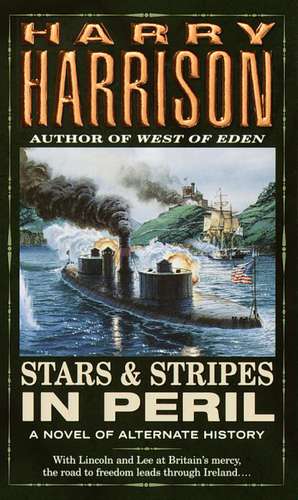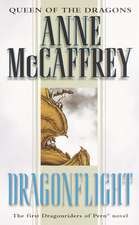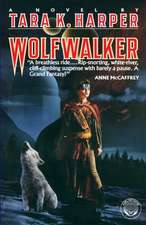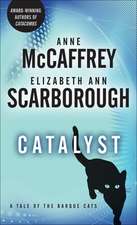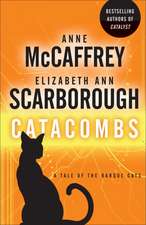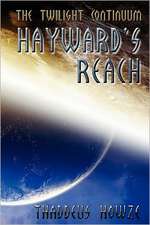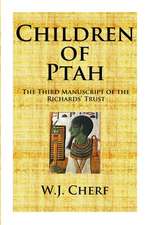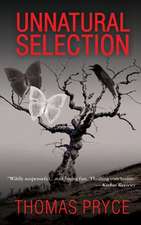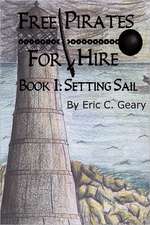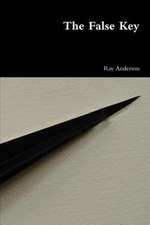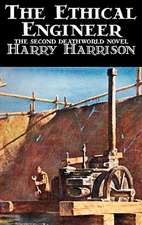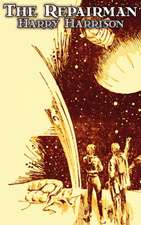Stars and Stripes in Peril
Autor Harry Harrisonen Limba Engleză Paperback – 30 sep 2001
—The New York Times Book Review
In the midst of Civil War, a stunned North and South join forces to combat a sudden attack of British troops. Though the Americans are victorious, three years later a new threat emerges. Her Majesty’s Army is massing for a possible attack through Texas. Into the gauntlet Lincoln sends his chosen angel of death, General Ulysses S. Grant—while his top soldiers, including Robert E. Lee and William Tecumseh Sherman, plan the most daring naval invasion ever launched: an assault on British soil itself.
Stars and Stripes in Peril is the new masterwork from one of the world’s most provocative authors. Venturing beyond a fascinating question of what if? Harry Harrison brilliantly examines the people and passions that make up nations both great and small—and shows how technology and politics had the power to shape history’s first great World War . . . half a century before it began . . .
"Lovers of novels of alternate history hold Harry Harrison in high regard and his latest book can only enhance that esteem."
—Abilene Reporter News
Preț: 53.30 lei
Nou
Puncte Express: 80
Preț estimativ în valută:
10.20€ • 10.64$ • 8.48£
10.20€ • 10.64$ • 8.48£
Carte disponibilă
Livrare economică 28 februarie-14 martie
Preluare comenzi: 021 569.72.76
Specificații
ISBN-13: 9780345409362
ISBN-10: 0345409361
Pagini: 352
Dimensiuni: 106 x 174 x 26 mm
Greutate: 0.17 kg
Editura: Del Rey Books
ISBN-10: 0345409361
Pagini: 352
Dimensiuni: 106 x 174 x 26 mm
Greutate: 0.17 kg
Editura: Del Rey Books
Notă biografică
Winner of the Nebula Award, the Prix Jules Verne, and the Premio Italia, Harry Harrison is famous for many works of speculative literature, including The Stainless Steel Rat series, Make Room! Make Room! (the basis for the movie Soylent Green), and the West of Eden trilogy. Harrison is currently working on the final volume of this alternate history trilogy. He lives in Ireland.
From the Hardcover edition.
From the Hardcover edition.
Extras
SALINA CRUZ, MEXICO—1863
The two British officers sat at the table on the veranda, sawing industriously at the tough steaks before them. Their faces, running with sweat, were almost as red as their uniform jackets. This was no meal to have in this moist, tropical climate—but they would have no other. No matter that the temperature was already in the nineties and that far lighter, and cooler, food was available. Red meat, well-boiled potatoes and overcooked vegetables, that was the only fit food for an Englishman. They chewed on the gristly freshly-killed beef, stopped only to pat at the perspiration on their foreheads with their kerchiefs when it ran into their eyes.
“And this is only April,” the officer with the pips of a captain said, then coughed as he washed down a mouthful of resisting meat with the thin red wine. He took a bite of the maize pancake with little relish; no proper bread either. “The food is impossible and the weather incredible. Worse than India I do believe. What will it be like in the summer?”
“Hot, old boy, damned hot. We’re in the tropics you know,” the major said. He looked out at the crowded life that was now surging through the tiny fishing village of Salina Cruz on the Pacific coast of Mexico. The arrival of the transport ships, now anchored close off shore, had changed everything. Fields had been trampled down so tents could be erected. The locals, in their white clothes and wide-brimmed hats, were well outnumbered by the variously uniformed soldiers of the British army. Many had been turned out of their homes so that the officers could live in comfort. The displaced Indians had built reed-shelters on the beach, where they waited with stolid patience for the tall strangers to leave. Meanwhile they earned some much-needed money by selling the invaders freshly caught fish. The major pointed with his fork.
A SECRET INVASION
“Madras sappers, and miners. They should work a lot better in this climate than the Sherwood Foresters and Dragoon guards.”
The captain nodded agreement. “Heat—and disease, there is no escaping them. Working in the sun, the men are exhausted almost as soon as they begin their daily labors. And they are weakened as well. They get the fever and die from it, more every day. We must be losing ten men to the mile building this road.”
“Nearer twenty I would say. Take a look at the new cemetery near the shore.”
“Too depressing. So it is, let us say, a hundred miles, from the Pacific to the coastal plain and then on to the Atlantic Ocean. At this rate we will lose a regiment that way.”
“It’s the same distance again, if not more, to Vera Cruz.”
“Yes, but the land there is dead flat. Once the road reaches the plain it will just be a matter of smoothing the donkey track that is already there.”
“I pray you are right. England is too far from this stinking hole. I fear that I will die here and be buried in the moldy soil. I despair of ever seeing her blissfully cold and fog-shrouded shores ever again.”
The dark-skinned man at a nearby table apparently took no notice of them. His thin shirt was more suited to the climate than their wool tunics. His meal of guacamole and juevos rancheros was far easier to digest as well. He scooped the last of it off of his plate with half of a fresh tortilla. Washed it down with black coffee, sighed and belched slightly. A single languid wave of his hand brought the proprietor rushing over to serve him.
“A sus órdenes, Don Ambrosio.”
“Un puro.”
“Ahoritita.”
The fat owner of the cantina hurried away and returned moments later with an open box of long cigars. He held it out for inspection. Don Ambrosio took his time in selecting one, then held it to his ear and rolled the tip in his fingers to test the cigar’s texture. He nodded approval, opened a large clasp knife and carefully cut off the end of the black Orizaba cigar. The proprietor, Chucho, scratched a sulfur match on the underside of the table, waved it to life, then carefully lit the cigar.
“You, there, more wine,” the captain shouted. Chucho did not respond until the cigar was lit and drawing well. Only then did he stroll slowly into the back room, returned some minutes later with a clay jug.
“The locals get all the service, don’t they,” the captain said, scowling in the direction of the dark-skinned man who was languidly blowing a cloud of rich smoke into the air.
“Helps to speak the lingo I imagine.”
The wine slopped onto the table when Chucho put the jug down. He wiped at it lazily with his stained apron. Major Chalmers sipped at his wine and looked idly at the man at the other table who was now using his clasp knife to sharpen a point on his pencil. He put the knife away, opened a small bound book and began to write. The major looked at him and frowned with suspicion.
“I say—who’s that blighter?”
“Mande?”
“That man, the one at that table there who is doing the writing. Who is he?”
“Yes. He ees Don Ambrosio. A big planter from Santo Domingo Tehuantepec. Much land, many trees with fruits.”
“Next town down the road,” the captain said. “What’s he writing down in that bloody book? Has he been listening to us? I can’t say that I like any of this.”
“Nor do I,” Chalmers said, coldly suspicious. “If he speaks English he could overhear our conversation with great ease. Does he understand English?”
The proprietor shrugged and called out deferentially to the gentleman.
“Mil perdones, Don Ambrosio. Habla usted inglés?”
“Solamente español, Chucho.”
“He say he only speak Spanish. No one speak English here but me ‘cause I work with gringos to the norte. Most not even talk Spanish, got a language of their own . . .”
“I couldn’t care less about that. What I want to know then is what he is writing in that infernal book?”
Chucho raised his eyes heavenward as though seeking inspiration there. “Don Ambrosio he is a very great man, he is also a great, how you say it, he is a poeta.”
Hearing his name spoken the don turned and smiled at the officers.
“Poesía, si.” He riffled through the book, found the right page, then read from it with great Latin feeling.
Mexicanos al grita de guerra
el acero aprestad y el bridón,
y retiemble en sus centros la Tierra
al sonoro rugir del cañón.”
“Mas si osare un extraño enemigo
profanar con su planta tu suelo,
pensa, oh Patria querida!, que el cielo
un soldado en cada hijo te dio.*
The bored officers turned their attention back to their tough steaks while the poem was being read aloud. Chucho stayed and listened to the poem with wide-eyed appreciation, turning reluctantly away only when the officers called out loudly for their bill. As always they cursed him and called him a thief. He reluctantly lowered his price, still charging three times what he normally would.
Only when the Englishmen had paid and gone did the Don flip back through the pages of the book to check his memory. Dragoon guards, yes, and Bengal cavalry. And Bombay infantry. And how many men there were who died every day. He looked through the handwritten pages and nodded happily. Good, very, very good. More than enough. His visit to the village was coming to an end.
“You have a quick mind, Chucho,” he said when the man came over to clear his plate away. “I should have been more circumspect when I was making notes—but I wanted to get those outlandish foreign names down before I forgot them. I have never seen any of the places they mentioned, but I am sure that there are men who have. You were inspired to tell them that I was a poet. You deserve every peso I promised—and more.” The small bag clinked when he pushed it across the table; it vanished instantly under Chucho’s apron.
“Well, it looked like a book of poems. And I was right, that was a most powerful and inspiring poem about our country’s battles—”
“And written by a powerful poet, alas not me. I take no credit for it. That was written by the patriot Francisco González Bocanegra, Mexico’s greatest poet. He gave his life for his country, just two years ago. Now—get in touch with Miguel, tell him we leave at dawn.”
*see page 335
* * *
At first light Don Ambrosio was waiting outside the half-ruined hut where he had been staying for the past weeks. The Indian woman in the adjoining house had cooked meals for him, and washed his clothes, and was more than grateful for the few coins he gave her. Miguel had been caring for his horse at one of the nearby farms. She whinnied when she saw him and he rubbed her nose with affection. In a fit of classi- cal enthusiasm he had named her Rocinante after the great knight’s own mount.
“She looks fine.”
“There was good grass there. She was in the fields with the donkeys.”
Miguel’s donkey was so small that the rider’s feet almost dragged in the dust of the trail. He led another donkey loaded with their belongings, while Don Ambrosio brought up the rear mounted on his fine bay. The full force of the sun blasted down when they left the narrow village streets. The Don wore his wide-brimmed and handsomely decorated sombrero on his back secured by its string; he put it onto his head and settled it into place.
They quickly left the small village behind and followed a twisting path into the jungle beyond. There was shade under the trees now, but little relief from the muggy heat. They plodded on. For a short while their path paralleled that of the new road below, where it cut a dusty track through the forest. When they passed through the occasional clearing they could see the laboring soldiers hacking through the jungle and digging into the rich volcanic soil. When the road was finished it would stretch from Salina Cruz on the Pacific coast, right across the narrow Isthmus of Tehuantepec, to Vera Cruz on the Atlantic shore. That’s what the officers had said: he had heard it more than once. They talked a lot when they drank, never considering for a moment that they might be overheard. All of them agreed that this was a most ambitious project. Don Ambrosio agreed with them—and a most unusual one in this poverty-stricken and neglected country. Because when it was finished it would also be the only road in all of Mexico. The British were the first invaders to ever have bothered building a road. Certainly the Spanish, in all their centuries of occupation never had. The most recent invaders of this unfortunate country, the French and the Austrians, had followed suit. All of them too interested in plundering the country so that there was never enough time to bother bringing the benefits of civilization to these shores. Communications were slow and commerce primitive where all of the messages and trade between cities went on muleback.
The two British officers sat at the table on the veranda, sawing industriously at the tough steaks before them. Their faces, running with sweat, were almost as red as their uniform jackets. This was no meal to have in this moist, tropical climate—but they would have no other. No matter that the temperature was already in the nineties and that far lighter, and cooler, food was available. Red meat, well-boiled potatoes and overcooked vegetables, that was the only fit food for an Englishman. They chewed on the gristly freshly-killed beef, stopped only to pat at the perspiration on their foreheads with their kerchiefs when it ran into their eyes.
“And this is only April,” the officer with the pips of a captain said, then coughed as he washed down a mouthful of resisting meat with the thin red wine. He took a bite of the maize pancake with little relish; no proper bread either. “The food is impossible and the weather incredible. Worse than India I do believe. What will it be like in the summer?”
“Hot, old boy, damned hot. We’re in the tropics you know,” the major said. He looked out at the crowded life that was now surging through the tiny fishing village of Salina Cruz on the Pacific coast of Mexico. The arrival of the transport ships, now anchored close off shore, had changed everything. Fields had been trampled down so tents could be erected. The locals, in their white clothes and wide-brimmed hats, were well outnumbered by the variously uniformed soldiers of the British army. Many had been turned out of their homes so that the officers could live in comfort. The displaced Indians had built reed-shelters on the beach, where they waited with stolid patience for the tall strangers to leave. Meanwhile they earned some much-needed money by selling the invaders freshly caught fish. The major pointed with his fork.
A SECRET INVASION
“Madras sappers, and miners. They should work a lot better in this climate than the Sherwood Foresters and Dragoon guards.”
The captain nodded agreement. “Heat—and disease, there is no escaping them. Working in the sun, the men are exhausted almost as soon as they begin their daily labors. And they are weakened as well. They get the fever and die from it, more every day. We must be losing ten men to the mile building this road.”
“Nearer twenty I would say. Take a look at the new cemetery near the shore.”
“Too depressing. So it is, let us say, a hundred miles, from the Pacific to the coastal plain and then on to the Atlantic Ocean. At this rate we will lose a regiment that way.”
“It’s the same distance again, if not more, to Vera Cruz.”
“Yes, but the land there is dead flat. Once the road reaches the plain it will just be a matter of smoothing the donkey track that is already there.”
“I pray you are right. England is too far from this stinking hole. I fear that I will die here and be buried in the moldy soil. I despair of ever seeing her blissfully cold and fog-shrouded shores ever again.”
The dark-skinned man at a nearby table apparently took no notice of them. His thin shirt was more suited to the climate than their wool tunics. His meal of guacamole and juevos rancheros was far easier to digest as well. He scooped the last of it off of his plate with half of a fresh tortilla. Washed it down with black coffee, sighed and belched slightly. A single languid wave of his hand brought the proprietor rushing over to serve him.
“A sus órdenes, Don Ambrosio.”
“Un puro.”
“Ahoritita.”
The fat owner of the cantina hurried away and returned moments later with an open box of long cigars. He held it out for inspection. Don Ambrosio took his time in selecting one, then held it to his ear and rolled the tip in his fingers to test the cigar’s texture. He nodded approval, opened a large clasp knife and carefully cut off the end of the black Orizaba cigar. The proprietor, Chucho, scratched a sulfur match on the underside of the table, waved it to life, then carefully lit the cigar.
“You, there, more wine,” the captain shouted. Chucho did not respond until the cigar was lit and drawing well. Only then did he stroll slowly into the back room, returned some minutes later with a clay jug.
“The locals get all the service, don’t they,” the captain said, scowling in the direction of the dark-skinned man who was languidly blowing a cloud of rich smoke into the air.
“Helps to speak the lingo I imagine.”
The wine slopped onto the table when Chucho put the jug down. He wiped at it lazily with his stained apron. Major Chalmers sipped at his wine and looked idly at the man at the other table who was now using his clasp knife to sharpen a point on his pencil. He put the knife away, opened a small bound book and began to write. The major looked at him and frowned with suspicion.
“I say—who’s that blighter?”
“Mande?”
“That man, the one at that table there who is doing the writing. Who is he?”
“Yes. He ees Don Ambrosio. A big planter from Santo Domingo Tehuantepec. Much land, many trees with fruits.”
“Next town down the road,” the captain said. “What’s he writing down in that bloody book? Has he been listening to us? I can’t say that I like any of this.”
“Nor do I,” Chalmers said, coldly suspicious. “If he speaks English he could overhear our conversation with great ease. Does he understand English?”
The proprietor shrugged and called out deferentially to the gentleman.
“Mil perdones, Don Ambrosio. Habla usted inglés?”
“Solamente español, Chucho.”
“He say he only speak Spanish. No one speak English here but me ‘cause I work with gringos to the norte. Most not even talk Spanish, got a language of their own . . .”
“I couldn’t care less about that. What I want to know then is what he is writing in that infernal book?”
Chucho raised his eyes heavenward as though seeking inspiration there. “Don Ambrosio he is a very great man, he is also a great, how you say it, he is a poeta.”
Hearing his name spoken the don turned and smiled at the officers.
“Poesía, si.” He riffled through the book, found the right page, then read from it with great Latin feeling.
Mexicanos al grita de guerra
el acero aprestad y el bridón,
y retiemble en sus centros la Tierra
al sonoro rugir del cañón.”
“Mas si osare un extraño enemigo
profanar con su planta tu suelo,
pensa, oh Patria querida!, que el cielo
un soldado en cada hijo te dio.*
The bored officers turned their attention back to their tough steaks while the poem was being read aloud. Chucho stayed and listened to the poem with wide-eyed appreciation, turning reluctantly away only when the officers called out loudly for their bill. As always they cursed him and called him a thief. He reluctantly lowered his price, still charging three times what he normally would.
Only when the Englishmen had paid and gone did the Don flip back through the pages of the book to check his memory. Dragoon guards, yes, and Bengal cavalry. And Bombay infantry. And how many men there were who died every day. He looked through the handwritten pages and nodded happily. Good, very, very good. More than enough. His visit to the village was coming to an end.
“You have a quick mind, Chucho,” he said when the man came over to clear his plate away. “I should have been more circumspect when I was making notes—but I wanted to get those outlandish foreign names down before I forgot them. I have never seen any of the places they mentioned, but I am sure that there are men who have. You were inspired to tell them that I was a poet. You deserve every peso I promised—and more.” The small bag clinked when he pushed it across the table; it vanished instantly under Chucho’s apron.
“Well, it looked like a book of poems. And I was right, that was a most powerful and inspiring poem about our country’s battles—”
“And written by a powerful poet, alas not me. I take no credit for it. That was written by the patriot Francisco González Bocanegra, Mexico’s greatest poet. He gave his life for his country, just two years ago. Now—get in touch with Miguel, tell him we leave at dawn.”
*see page 335
* * *
At first light Don Ambrosio was waiting outside the half-ruined hut where he had been staying for the past weeks. The Indian woman in the adjoining house had cooked meals for him, and washed his clothes, and was more than grateful for the few coins he gave her. Miguel had been caring for his horse at one of the nearby farms. She whinnied when she saw him and he rubbed her nose with affection. In a fit of classi- cal enthusiasm he had named her Rocinante after the great knight’s own mount.
“She looks fine.”
“There was good grass there. She was in the fields with the donkeys.”
Miguel’s donkey was so small that the rider’s feet almost dragged in the dust of the trail. He led another donkey loaded with their belongings, while Don Ambrosio brought up the rear mounted on his fine bay. The full force of the sun blasted down when they left the narrow village streets. The Don wore his wide-brimmed and handsomely decorated sombrero on his back secured by its string; he put it onto his head and settled it into place.
They quickly left the small village behind and followed a twisting path into the jungle beyond. There was shade under the trees now, but little relief from the muggy heat. They plodded on. For a short while their path paralleled that of the new road below, where it cut a dusty track through the forest. When they passed through the occasional clearing they could see the laboring soldiers hacking through the jungle and digging into the rich volcanic soil. When the road was finished it would stretch from Salina Cruz on the Pacific coast, right across the narrow Isthmus of Tehuantepec, to Vera Cruz on the Atlantic shore. That’s what the officers had said: he had heard it more than once. They talked a lot when they drank, never considering for a moment that they might be overheard. All of them agreed that this was a most ambitious project. Don Ambrosio agreed with them—and a most unusual one in this poverty-stricken and neglected country. Because when it was finished it would also be the only road in all of Mexico. The British were the first invaders to ever have bothered building a road. Certainly the Spanish, in all their centuries of occupation never had. The most recent invaders of this unfortunate country, the French and the Austrians, had followed suit. All of them too interested in plundering the country so that there was never enough time to bother bringing the benefits of civilization to these shores. Communications were slow and commerce primitive where all of the messages and trade between cities went on muleback.
Descriere
In the second title of the Civil War-era Alternate History trilogy, North and South join forces to repel a British invasion. Now, Her Majesty's Army is massing for a possible attack through Texas. In the gauntlet, Lincoln sends his chosen angel of death, General Ulysses S. Grant, while his top soldiers, including Robert E. Lee and William Tecumseh Sherman, plan a naval assault on British soil.
